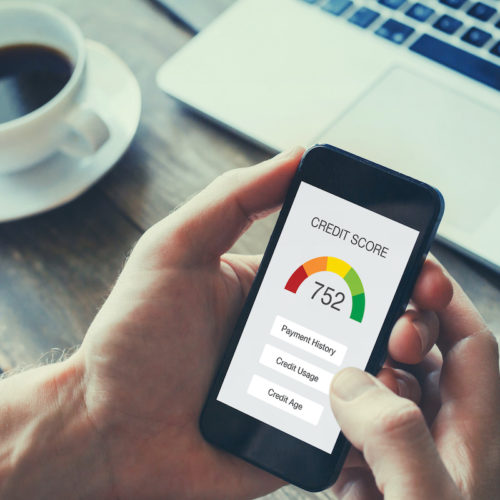Having a good credit score is important for a variety of reasons. Most importantly, the better your score, the lower the interest rates you’re likely to pay on loans. That translates to thousands of dollars saved over the years.
If you recently looked at your score and are wondering, “why did my credit score go down?” you’ve come to the right place. In this post, you’ll learn about what might have impacted your score so you can take corrective action.
Actions that make a credit score drop
- Recent credit inquiries
- Heavy credit utilization rate
- Missed credit card payments
- Closing accounts
- Paying off loans
- Fraud and identity theft
- Unpaid medical bills
- Foreclosure
- Missed auto loan payments
Let’s start by reviewing the most common reasons credit scores plummet.
1. Recent credit inquiries
Any time you apply for a line of credit or loan, the lender checks if you’re a responsible borrower by making a credit inquiry, which is also called a credit check or credit pull.
When it comes to credit inquiries, there are two types: soft inquiries (soft checks or soft pulls) and hard inquiries (hard checks or hard pulls).
A soft inquiry happens when a lender scans your credit to approve an application. For example, mortgage providers typically use soft inquiries during the mortgage prequalification stage. Soft inquiries also occur whenever you check your credit online. Typically, soft inquiries have no impact on your credit score.
On the other hand, a hard inquiry is more comprehensive and requires analyzing your credit report and loan payment history. For example, hard pulls are typically required when your mortgage application moves into the pre-approval stage, or if you sign up for a new car loan or credit card.
When a lender pulls a hard inquiry, this has a bigger and longer-lasting impact on your credit score, typically causing your score to fall by a few points. The good news is that your score will most likely go back to normal in a few weeks or months, assuming no other credit-related events occur.
The main takeaway here is that if you recently applied for financing or a loan, this will most likely cause your credit score to go down. But you don’t need to worry so long as you’re aware of the reasons for this credit inquiry.
However, if your score has gone down due to a credit card or loan application you aren’t aware of, this could be a sign of fraud or identity theft and something you need to look into immediately (more on that later).
2. Heavy credit utilization rate
Credit utilization has to do with the amount of credit you’re using versus the total amount of credit you have.
When you use too much available credit, your credit utilization rises and this could negatively impact your score. The general rule is to keep your credit utilization at 30% or less.
This means that if you have $10,000 in available credit, you don’t want to carry a balance of more than $3,000. If you need to put $3,000 on a credit card and you only have a $10,000 line of credit, you may want to consider asking for a credit line increase in advance of the transaction, which may help you avoid negatively impacting your score.
3. Missed credit card payments
Credit card companies typically give customers a grace period of 14 days after the due date to make payments before the late payment is classified as “missed.”
Unfortunately, missed payments can cause a significant drop in your credit score. It also can send the message to lenders that you’re not a responsible borrower or that you’re in over your head with bills.
Best practices suggest paying off your credit card balances in full each month. If that isn’t possible, be sure that you make the minimum payments to avoid issues.
4. Closing accounts
Consumers often close lines of credit, thinking it will help their score, or maybe they want to avoid overspending. Yet when you close a credit card account, it actually impacts your score.
Closing a line of credit causes total credit utilization to increase, and it also reduces the average age and length of your credit history.
Suppose you have an old credit card you opened ten years ago that you no longer use. This card is most likely one of your first lines of credit. If you close it, you’re essentially deleting the past ten years of your credit history, which affects your score.
The better approach is to pay off the unused card and keep it to maintain the line of credit. Depending on the credit card company, you may be required to use the card periodically to keep it open.
If you absolutely want to close the card out, that’s not a big deal. So long as you have other lines of credit open and maintain consistent payment history, your score should rebound. Just be sure not to close out any credit products before applying for a mortgage or car loan so your score stays in good shape.
5. Paying off loans
Paying off a loan is a fantastic feeling, and you should always strive to keep your loans at a minimum. However, if you’ve recently paid off an installment loan, this might cause a temporary drop in your credit score.
Primarily, this happens if the loan was one of the only lines of credit you had or if it was the only line of credit for which you had a low balance.
6. Fraud and identity theft
Security issues like fraud and identity theft can also cause major problems with your score. This is why it’s a good personal finance strategy to keep an eye on your credit report so you can make sure nothing fishy is going on.
For example, if someone steals your identity, they could open up a new credit card using your personal info. They could then rack up purchases using the credit card and not pay them off. As a result, your credit can get destroyed without you having any knowledge of the situation.
To avoid this fate, see if your credit card company or bank can send you fraud alerts when suspicious transactions occur.
7. Unpaid medical bills
In some states, unpaid medical bills can cause your credit score to drop.
It’s important to know your rights in your state. And if you have trouble paying a medical bill, you should consider asking for financial assistance from the medical provider. It’s not guaranteed, but you may be eligible for help.
8. Foreclosure
Foreclosing on a house is a major credit event that will have a seriously negative impact on your credit profile.
If you’re in danger of foreclosing due to missed payments, talk to your lender and consider taking out a loan, refinancing, or seeking alternative funding.
9. Missed auto loan payments
Missing auto loan payments is a severe breach of contract. Not only will this negatively impact your credit score, but it can also result in the lender seizing your car.
If you have an auto loan, make your payments in full and on time to avoid penalties.
Tips for improving your credit score
With so many pitfalls to watch out for, managing your credit may seem difficult. Here are some easy strategies for maintaining a solid score.
Keep multiple cards open
One way to boost your score is to open several credit cards, which can increase your available credit and demonstrate responsible credit usage.
The key is to open credit cards slowly to avoid getting multiple hard inquiries in a short amount of time. Shop around for the best rewards, and open cards strategically. For example, you could open one new card a year for a few years and most likely not have any issues.
If you’re opening a new card specifically to get a sign-up bonus, be sure you can pay off your balance in full. Otherwise, the bonus will effectively be worthless.
Ask to increase your line of credit
Another strategy is to ask your credit card providers for credit limit increases. Before asking, your account should be in good standing, and you should make monthly payments on time.
Suppose Joe opens his first credit card and gets a $3,000 limit. After a year of making on-time payments, Joe might be able to get his credit limit increased to $12,000, increasing his access to credit by a factor of four simply by talking to his credit card provider.
Stick to a budget
Credit card access requires a tremendous amount of discipline because it’s very easy to overspend.
The best long-term strategy is sticking to a budget and ensuring your balances are paid in full each month. If you find yourself unable to pay your credit card bills, it might be time to cut back on your spending in other areas.
Monitor your credit
All too often, people neglect their credit scores until they go to apply for a loan to make a large purchase (e.g., car loan or mortgage).
Stay one step ahead by monitoring your credit score throughout the year. AnnualCreditReport.com offers one free credit report each year. You can also consider signing up for a real-time credit monitoring service.
Make on-time payments
The best way to improve your credit score is to consistently make on-time payments on any debt, including credit cards, student loans, and installment loans. If you do this for a long period of time, your credit score should go up.
Learn more:
Why it pays to have good credit
Having good credit is important because so many factors depend on it, and failure to maintain a positive score can have catastrophic consequences.
Here are some of the various things that require good credit.
Low interest rates
Buying a large ticket item like a car or a house often requires taking out a loan. And one of the first things lenders check when issuing loans is your credit score.
You can still get items like cars and houses with poor credit, but it’s going to impact your interest rate. Simply put, the best rates are reserved for those with the best credit.
Car rentals
Some rental car agencies require a minimum credit score to rent a vehicle. Having poor credit can result in service denial.
Employment
The Fair Credit Reporting Act (FCRA) prevents employers from checking your credit history without your consent. However, it’s not uncommon for a company to request a credit score during the application process.
Having poor credit could demonstrate to an employer that you may be a higher risk applicant, potentially damaging your chances of finding work.
Housing
When you apply to rent a home, the landlord will most likely run a credit check to verify you’re a responsible tenant. If your score is bad, this might indicate to the landlord that you won’t be able to pay your rent on time. As a result, you may not get approved to rent the place you want.
Frequently Asked Questions
Can opening a new credit card impact your score?
Opening a new credit card could potentially lower your credit score in the short term because the credit card issuer has to perform a hard inquiry on your report.
However, having another credit card can help your score in the long run because your available credit will go up. The more credit you have, the better it is for your score.
Ultimately, it depends on your ability to manage credit. Those who spend recklessly and don’t pay off balances will run into trouble, while responsible borrowers won’t have anything to worry about.
What are the major credit reporting bureaus?
The U.S. credit system has three major agencies that collect and manage consumer credit data: Equifax, Experian, and TransUnion. These for-profit organizations make money by selling consumer data to lenders and other financial institutions and offering credit monitoring and reporting services to consumers.
Where can I get a free credit report?
The three nationwide credit reporting companies must provide one free credit report to customers every 12 months.
According to the Federal Trade Commission (FTC), the only official website for free credit reports is AnnualCreditReport.com.
What is a FICO score?
FICO stands for the Fair, Isaac and Company, the first company that associated credit scoring models with lending risk.
Your FICO credit score is a three-digit number that indicates your creditworthiness, ranging from 300 to 850, as follows:
- Poor credit: 300 to 579
- Fair credit: 580 to 669
- Good credit: 670 to 739
- Very good: 740 to 799
- Exceptional: 800 to 850
What is a credit limit?
Credit limit refers to the maximum balance you can carry at a particular time with a line of credit.
For example, a credit card may have a limit of $10,000. This means the maximum amount you can charge to the card is $10,000.
It’s very important to pay down your balances and manage credit responsibly to avoid approaching your credit limits.
The Bottom Line
As you can see, your credit score can go down for a number of reasons. Some can be very minor, resulting in temporary declines, while others can be very serious.
Your best bet is to stay in the loop on your credit score at all times. Avoid taking on too much credit card debt, and always pay off your balances on time.





No comments yet. Add your own